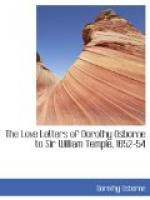Temple’s mother was a sister of Dr. Hammond, to whom one Dr. John Collop, a poetaster unknown in these days even by name, begins an ode—
“Seraphic Doctor, bright evangelist.”
The “seraphic Doctor” was rector of Penshurst, near Tunbridge Wells, the seat of the Sydneys. From Hammond, who was a zealous adherent of Charles I., Temple received much of his early education. When the Parliament drove Dr. Hammond from his living, Temple was sent to school at Bishop-Stortford; and the rest of his early life, with an account of his meeting with Dorothy, has been already set down for us by Macaulay.
Anno Domini sixteen hundred and fifty-three;—let us look round through historic mist for landmarks, so that we may know our whereabouts. The narrow streets of Worcester had been but lately stained by the blood of heaped corpses. Cromwell was meditating an abolition of the Parliament, and a practical coronation of himself. The world had ceased to wonder at English democracy giving laws to their quondam rulers, and the democracy was beginning to be a little tired of itself, to disbelieve in its own irksome discipline, and to sigh for the flesh-pots of a modified Presbyterian monarchy. Cromwell, indeed, was at the height of his glory, his honours lie thick upon him, and now, if ever, he is the regal Cromwell that Victor Hugo has portrayed, the uncrowned King of England, trampling under foot that sacred liberty, the baseless ideal for which so many had fought and bled. He is soon to be Lord Protector. He is second to none upon earth. England is again at peace with herself, and takes her position as one of the great Powers of Europe; Cromwell is England’s king. So much for our rulers and politics. Now let us remember our friends, those whom we love on account of the work they have done for us and bequeathed to us, through which we have learned to know them. One of the best beloved and gentlest of these, who by the satire of heaven was born into England in these troublous times, was now wandering by brook and stream, scarcely annoyed by the uproar and confusion of the factions around him. And what he knew of England in these days he has left in perhaps the gentlest and most peaceful volume the world has ever read. I speak of Master Izaak Walton, who in this year, 1653, published the first edition of his Compleat Angler, and left a comrade for the idle hours of all future ages. Other friends we have, then living, but none so intimate or well beloved. Mr. Waller, whom Dorothy may have known, Mr. Cowley, Sir Peter Lely,—who painted our heroine’s portrait,—and Dr. Jeremy Taylor; very courtly and superior persons are some of these, and far removed from our world. Milton is too sublime to be called our friend, but he was Cromwell’s friend at this time. Evelyn, too, is already making notes in his journal at Paris and elsewhere; but little prattling Pepys has not yet begun diary-making. Other names will come




